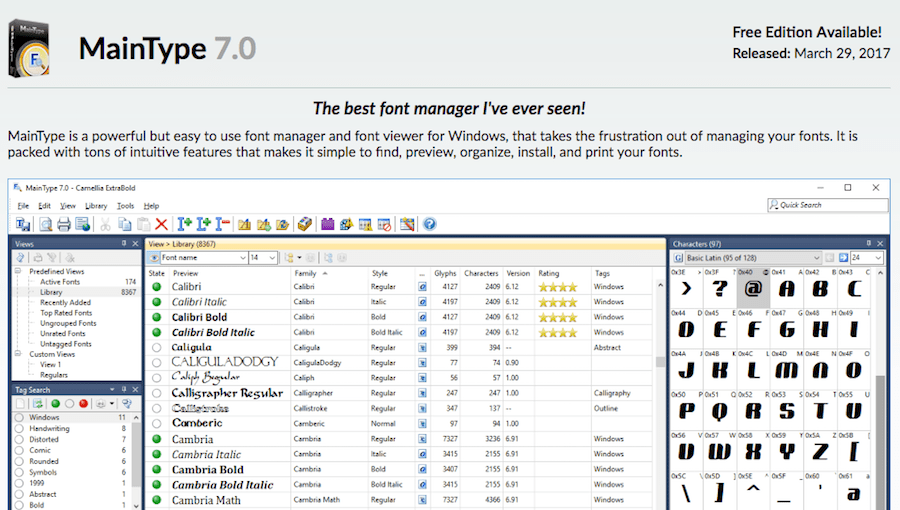

- #Free font viewer how to#
- #Free font viewer install#
- #Free font viewer archive#
- #Free font viewer full#
- #Free font viewer portable#
That’s something most graphic designers will tell you, and that’s the way our visual perception works. Why do you need a Mac font manager?įonts and colors define content. So you’ll still need to disable it if you don’t want to have duplicates across collections. Note that you don’t remove a font from its original collection when you drag it somewhere else. Alternatively, click the plus button in the bottom left corner to add fonts. Once you’ve saved it, drag fonts to the collection the same way you’ve done with libraries. To add new collections, select File ➙ New Collection. These will point to specific installed fonts across your libraries. You can also customize libraries by creating collections inside them.

Go to the File menu and select New Library.

If these are not enough, you can create your custom libraries of fonts: User fonts are available to the admin only, and Computer fonts - to anyone accessing a Mac. The last two are stored in the Library folder. Bring fonts into libraries and collectionsįont Book has four default libraries: All, English, User, and Computer. This will get the font right into your Font Book.
#Free font viewer install#
Once you unpack a zip with a new font, select the file with a corresponding extension to open preview and click Install Font. You can also download a new font from the internet and use it with Font Book (the supported extensions are otf.
#Free font viewer full#
#Free font viewer how to#
How to manage fonts on MacĪpple knows a designer’s pain points as well. For instance, if you say Verdana, you mean a family of fonts which includes Verdana Regular, Verdana Italic, and more. On a Mac, you have fonts, each of which is an individual style with distinctive width and weight properties - even though they might belong to the same typeface. So basically, a font is a set of characteristics that define a style of a typeface. Coming from the age of the printing press, fonts were used as the variations of a typeface family - differing in weight, size, etc. In graphic design, the notions of font and typeface are often used interchangeably. Pinky promise, we’re gonna be finished with that in a sec. The application should provide something like a standard "File > Open" dialogue box, and allow me to select any font file.Try free ✕ Font or typeface, what’s the difference?Ī few boring definitions to start with. Secondly, I need to note that the application should not be limited to installed fonts (that is, located in "Windows/Fonts" directory)! I need to open a font file which may be located in any directory, without having to "install" the font.

I expect to see a grid with all glyphs contained in the font, but without glyphs not supported by the font, and without empty (unused) cells. What will I see? A giant Unicode grid with many thousands of empty cells and a small amount of cells showing how its corresponding char looks in the font? This type of interface seems totally useless for me. what should I do with such a grid? Suppose I open a font that contains only 100 glyphs. The reason of my dissatisfaction with BabelMap is that it's not a font viewer, it's a character map which shows me the entire Unicode grid, but. It is not the application that shows me a portion of text typed in the selected font, it is the application with the interface similar to BabelMap. NET/Java applications are not acceptable.įirstly, I need to define what I mean by "font viewer".
#Free font viewer archive#
zip archive instead of setup.exe installer) which will never need administrative rights to run.
#Free font viewer portable#
Having a standalone portable version (usually, it's just a.I just need some piece of software to quickly open a font file and check what's inside.


 0 kommentar(er)
0 kommentar(er)
